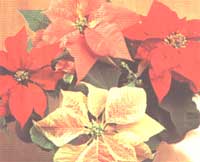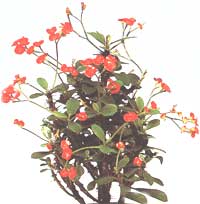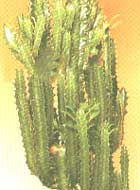Spurge / euphorbia
Refers to the family of euphorbia.
General description: Molochai are succulent plants of very diverse shapes and sizes. A universal sign is the milky juice of snow-white color, poisonous, which causes burns of mucous membranes, which stands out on slices or sections of stems and leaves.
Usually in the room conditions the following species are bred:
- Euphorbia milii (splendens) (Milk Mile or Euphorbia shining) is a small bush with stiff erect stems covered with sharp and long spines. Leaves are oblong, bright green. His flowers are small, yellow, but bracts are very bright (color: scarlet, yellow, salmon), they are usually taken for real flowers. A fairly unpretentious plant;
- Euphorbia tirucalli (Euphorbia tirucalli) is also a bush, but has no leaves or spines. Its shape is shaped by very peculiar stems, similar to small, fleshy sticks;
- Euphorbia obesa (Euphorbia obesa) also does not own thorns, its stalk is spherical, like a cactus. On it are visible ribs with warty formations;
- Euphorbia pulcherrima (Euphorbia or Poinsettia) . This species in the Catholic countries is a symbol of Christmas, at this time it is very beautiful blossoms. Large red, snow-white or pink leaves appear under fairly small inflorescences. This species is considered one-year, it is difficult to provide a comfortable wintering;
- Euphorbia polygona (Euphorbia polygona) has fleshy round-ribbed stems. Ribs have warty upbringings and thorns. It flowers with small yellowish inflorescences.
Recommendations for caring for the plant Spurge:
Illumination : Photophilous, prefer southern windows, but in the spring should be carefully accustomed to direct sunlight, in order to avoid burns.
Irrigation mode : Moderate, by the measure of drying of the soil. In the winter, outlandish. To water with warm soft water.
Humidity of air : Periodic warm spraying is desirable, but the spurge is not exacting to the humidity of the atmosphere.
Temperature regime : In summer, the temperature should be moderate 20-25 ° C., In the winter cool 10-16 ° C.
Soil : Drainage is mandatory. You can add charcoal and brick chips.
Recommended soil mix: 1 share of sod, 1 share of leaf, 1 share of peat land and 1 share of sand.
During the growth period, it needs fertilizing once every 2 weeks with complex mineral fertilizers (for flowering or succulents, depending on the species).
Breeding : Dried cuttings on the atmosphere.
Transplant : Young plants are transplanted annually, mature, older than three years are transplanted after a couple of years.
Pests : Euphorbia is affected by aphids (form sticky excretions on the shoots apexes, buds), whiteflies (whitish or yellowish spots appear on the underside of the leaves), mealybugs (covered with snow-white cotton wool).
With a slight infection, the plant is allowed to help finish with a soap solution and a warm wash.
In case of severe damage, spraying with an insecticide solution is recommended.



Euphorbia - euphorbia obesa
Spurge of the large-horned euphorbia grandicornis
Euphorbia beautiful - euphorbia pulcherrima
Spurge of a mile - euphorbia milii


Comments
Commenting on, remember that the content and tone of your message can hurt the feelings of real people, show respect and tolerance to your interlocutors even if you do not share their opinion, your behavior in the conditions of freedom of expression and anonymity provided by the Internet, changes Not only virtual, but also the real world. All comments are hidden from the index, spam is controlled.